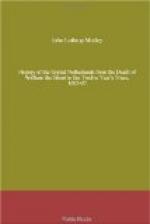This being a step in advance, it was decided to permit the visit of Neyen. It was, however, the recorded opinion of the distinguished personages to whom the proposal was made that it was a trick and a deception. The archdukes would, no doubt, it was said, nominally recognise the provinces as a free State, but without really meaning it. Meantime, they would do their best to corrupt the Government and to renew the war after the republic had by this means been separated from its friends.
John Neyen, father commissary of the Franciscans, who had thus invited himself to the momentous conference, was a very smooth Flemish friar, who seemed admirably adapted, for various reasons, to glide into the rebel country and into the hearts of the rebels. He was a Netherlander, born at Antwerp, when Antwerp was a portion of the united commonwealth, of a father who had been in the confidential service of William the Silent. He was eloquent in the Dutch language, and knew the character of the Dutch people. He had lived much at court, both in Madrid and Brussels, and was familiar with the ways of kings and courtiers. He was a holy man, incapable of a thought of worldly advancement for himself, but he was a master of the logic often thought most conclusive in those days; no man insinuating golden arguments more adroitly than he into half-reluctant palms. Blessed with a visage of more than Flemish frankness, he had in reality a most wily and unscrupulous disposition. Insensible to contumely, and incapable of accepting a rebuff, he could wind back to his purpose when less supple negotiators would have been crushed.
He was described by his admirers as uniting the wisdom of the serpent with the guilelessness of the dove. Who better than he then, in this double capacity, to coil himself around the rebellion, and to carry the olive-branch in his mouth?
On the 25th February the monk, disguised in the dress of a burgher, arrived at Ryswick, a village a mile and a half from the Hague. He was accompanied on the journey by Cruwel, and they gave themselves out as travelling tradesmen. After nightfall, a carriage having been sent to the hostelry, according to secret agreement, by Recorder Aerssens, John Neyen was brought to the Hague. The friar, as he was driven on through these hostile regions, was somewhat




